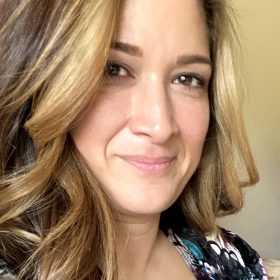Wendy Perla Kurtz

Wendy Perla Kurtz, PhD, is a Lecturer and Project Scientist in the Digital Humanities program at the University of California, Los Angeles, where she teaches courses and supports Digital Humanities projects through the Digital Research Consortium. Dr. Kurtz holds a PhD in Hispanic Literature from UCLA and her research lies at the intersection of cultural memory, digital mapping, and human rights. Her current project explores the ritualistic aspects of mourning practices represented in textual and visual media pertaining to the disinterment of mass graves from the Spanish Civil War and Franco dictatorship.
Education
- PhD in Hispanic Languages and Literatures. University of California, Los Angeles. 2017.
- Graduate Certificate in the Digital Humanities. University of California, Los Angeles. 2017.
- MA in Spanish. University of California, Los Angeles. 2011.
- BA in Spanish and Psychology. Claremont McKenna College. 2002.
Research
- 20th & 21st-century Peninsular Literature and Culture
- Geographic Information Systems (GIS) and Literature; Critical Mapping
- Computational Text Analysis
- Network Analysis
- Social Media Analysis
- Cultural Studies
- Memory Studies
- Performance Studies
- Gender Studies
Articles
Article (forthcoming – coauthored with Maite Zubiaurre). “Digitizing Erotica: A Virtual Wunderkammer: Sexual Cultures in Early Twentieth-Century Spain,” Towards the Digital History of the Other Silver Age Spain Production, Storage, Use, and Dissemination, edited by Dolores Romero López and Jeffrey Zamostny.
Article. “Mediating Memory: Mass Grave Recovery and Digital Culture in the Iberian Peninsula,” Bulletin for Spanish and Portuguese Historical Studies, 43.1 (2018), pp. 150-192, https://doi.org/10.26431/0739-182X.1287.
Book Chapter. “Visualizing Mass Grave Recovery: Ritual, Digital Culture and Geographic Information Systems.” Public Humanities and Spanish Civil War: Connected and Contested Histories, edited by Alison Ribeiro de Menezes, Antonio Cazorla-Sánchez and Adrian Shubert, Palgrave MacMillan, 2018, pp. 163-188.
Review. “Review of Sara J. Brenneis, Spaniards in Mauthausen: Representations of a Nazi Concentration Camp, 1940-2015,” Bulletin for Spanish and Portuguese Historical Studies, 44.1, art. 24 (2019), pp. 204-206. https://doi.org/10.26431/0739-182X.1347.
Interview. Chamberlin, Foster, host. “Episode 26. Digitally Mapping the Mass Graves of the Spanish Civil War with Wendy Perla Kurtz.” Historias: The Spanish History Podcast, 1 April, 2020.
Edited Book. Retana, Álvaro. Cuentos de Álvaro Retana (Las Locas de Postín; Los Ambiguos; Lolita, Buscadora de Emociones; El Tonto), edited by Maite Zubiaurre, Audrey Harris, and Wendy Kurtz, Stockcero, 2013.
Dissertation
In my dissertation titled “Mass Graves and Remembering through Ritual: Historical Memory in Contemporary Spanish Literature, Documentary Film, and Digital Culture,” I reflect on the performative aspects of mourning practices that pertain to the current disinterment and reburial of mass graves from the Spanish Civil War (1936-1939) and the ensuing dictatorship of Francisco Franco (1939-1975). With the enactment of the Historical Memory Law by Spanish Parliament in 2007, the Spanish public has a legal channel through which to exhume the over 2,600 mass graves found throughout Spain, northern Africa and the Canary ad Balearic Islands. I use critical theories of performance to argue the necessity to actualize funeral rites before a community of witnesses in order to disseminate memory. The disinterment process acts as a catalyst for the rebuilding of suppressed or unexplored sentiments silenced by a dictatorial regime and, later, through the transition to a democratic government. Departing from a cultural studies perspective, I include an analysis of “traditional texts,” such as novels and documentaries, but also consider a variety of digital media, such as blogs, Internet sites, YouTube short films, radio programs, and social media content from Facebook and Twitter groups. Studying the intersection of high cultural production (novels and documentaries) and digital popular culture facilitates a more comprehensive examination of the methods employed by contemporary Spanish society to retrieve collective memory of the war and postwar. One key component of my research is a digital “thick” map of mass grave locations on Spanish territories. I have built a digital map called Virtual Cartographies that layers data acquired from the Spanish Ministry of Justice with a robust collection of multimedia texts directly related to specific gravesites and examined in my dissertation.
Recent Presentations
- “Building Bridges: Pedagogical Strategies for Introducing Digital Humanities in the Undergraduate and Graduate Classroom.” Poster Presentation. Digital Humanities 2020. ADHO Virtual Conference. Coauthor: Sarah Ketchley. July 2020.
- “Putting Digital Humanities in Historical Journals” (Panelist). 134th Annual Meeting: American Historical Association. New York, New York. January 6, 2020.
- “Fundamentals of Text Mining: Curating, Preparing, Analyzing, and Visualizing Textual Data.” Learn@DLF. Digital Library Federation Forum. Co-presenters: Sarah Ketchley, PhD., Margaret Waligora, MLIS. October 14, 2019.
- “The Recuperation of Historical Memory in the Iberian Peninsula: Social Media as Resistance.” Digital Frontiers. The University of Texas at Austin. September 27, 2019.
- “Visualizing Polyphonic Histories in the Iberian Peninsula: Rituals of Recovery and Mass Grave Exhumations.” 49th Annual Conference: The Association for Spanish and Portuguese Historical Studies. Portland State University. April 5-7, 2018.
- “DH in the Kitchen: Scrumptious Recipes for Supporting Digital Scholarship.” The Collective 2018. Knoxville, Tennessee. March 1, 2018.
- “Virtual Cartographies: Mapping Historical Memory from the Spanish Civil War and Postwar Period.” Spatial Humanities. University of Lancaster, England. September 15, 2016.
- “A Sense of Place: Mapping Fictional Space in Literary Narratives. The Case of Bernardo Atxaga.” Digital Humanities 2014. Université de Lausanne & Ecole Polytechnique Fédérale de Lausanne. Lausanne, Switzerland. Coauthors: John Lynch & Michael Rocchio. July 11, 2014.

